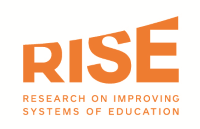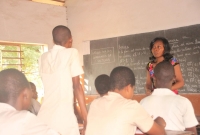The Institute for Empirical Research in Political Economy
IERPE (in French: IREEP)
Since its founding in 2004, the Institute for Empirical Research in Political Economy (IERPE; French: IREEP) has conducted over 30 projects dealing with Governance, Education, Financial Inclusion, History, Public Health, Security, Agricultural Policies, and Electoral Behavior. Noteworthy projects include “Education and Human Capital Externalities in Colonial Benin” (see Wantchekon et al. 2014) and a project on “Can Public Deliberation Overcome Clientelism? Experimental Evidence from Benin” (See Fujiwara and Wantchekon, 2013). Under the leadership of Dr. Ian Heffernan, Research Director of IERPE, the institute continues to rigorously research policy-relevant topics throughout West Africa.
In addition to ongoing consultancies, including annual data collection for the World Economic Forum’s Global Competitiveness Report, IERPE designs and leads numerous original research projects. Select IERPE-led projects are listed below. For a list of past projects, please visit the Archive tab.
Research on Improving Systems of Education (RISE) – Nigeria
https://riseprogramme.org/countries/nigeria
Led by Principal Investigator Leonard Wantchekon (ASE/Princeton) and carried out in partnership with the Centre for the Study of the Economies of Africa (CSEA), the Research on Improving Systems of Education (RISE) project in Nigeria aims to understand how demand-side issues (such as community engagement, parental aspirations or investments and student motivation) and local politics affect educational outcomes at the community level. RISE-Nigeria is one of seven countries included in the broader RISE Programme.
ASE is coordinating five studies on (i) the effects of mission and colonial schools, (ii) the 1952 Free Primary Education scheme in the Western Region, (iii) the impact of and potential improvements to the National Youth Service Corps, (iv) whether School Based Management Committees can be made more effective by increasing diversity or by gaining access to school performance data, and (v) whether constructive dialogues and commitment from policy actors have an impact on education. Project Activities: ASE has assembled the research team, which includes five other lead researchers and two newly-recruited post-doctoral fellows.
Field activities began in February 2019, and the project will continue until 2022. More details can be found on the RISE Nigeria website. Supported by the United Kingdom’s Foreign, Commonwealth and Development Office (FCDO), the Australian Department of Foreign Affairs and Trade (DFAT), and the Bill and Melinda Gates Foundation (BMGF).
Reducing violence through the creation of more inclusive economic opportunities for young people in Benin
The goal of this study is to propose effective strategies to combat violence and social and economic exclusion of young women and men in Benin through the production of new knowledge. Researchers collected secondary data on violence, employment, and youth labor market integration projects in Benin. Further quantitative data collection was selected for a sample of 1200 youth in households and over 575 pre-selected candidates for a youth employment program. The research team is currently conducting a qualitative data analysis to understand the historical, political, cultural background that could impact the propensity of a youth to become violent, with attention to gender.
In order to document the political riot that took place in Benin after the country’s legislative election in April 2019, researchers also interviewed political activists and individuals who took part in the riot. Some of the respondents were arrested and released, some were not. It was found that the motivation behind the protest was more political than economic.
The cohort has grown as researchers from Burkina Faso, Côte d’Ivoire and South Africa joined the teams in Benin and Kenya. The project has advanced through regular meetings, participation in the CHRIPS methodological workshop in Kenya, the organization of a methodological workshop, and the development of a global protocol for the cohort. Financed by the International Development Research Centre (IDRC).
Impact Evaluation of the Promotion of Girls’ Education in Benin: A Natural Experiment
Female schooling in Benin remains an area of concern. Lack of access to education for girls and gender inequities in schooling potentially affect areas such as female empowerment and employment, and child health and nutrition. Since 2010, the Beninese Ministry of Secondary Education has been addressing the issue of low female enrollment in schooling at the secondary level by fully subsidizing girls’ school fees. IERPE is evaluating the impact of the full subsidization of school fees by analyzing variation in the treatment status across birth-year cohorts. Financed by the International Initiative for Impact Evaluation.
Image (Top): ASE students and Communications Manager Wilfried Gnanvi visit a high school in Benin for Animath, a mathematics project.
Research Institute
Need a quick guide into ASE? Get our brochure

